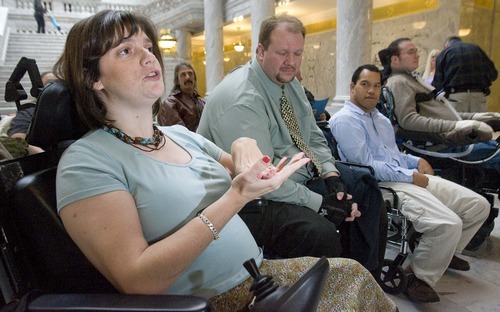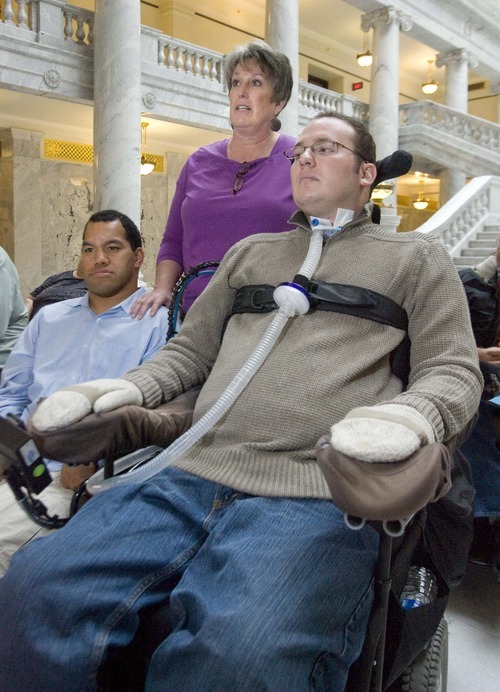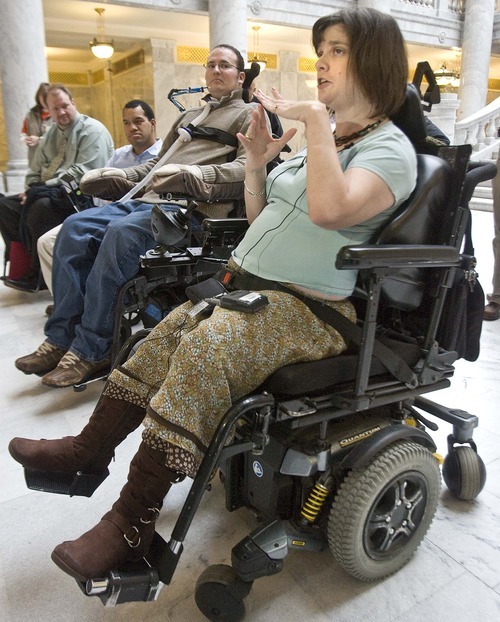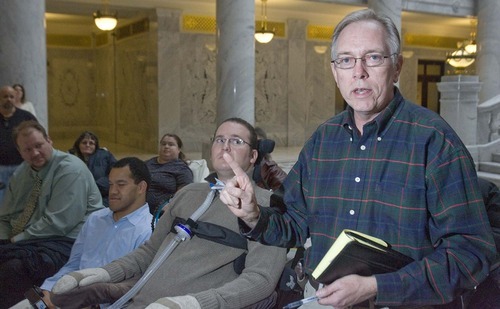This is an archived article that was published on sltrib.com in 2011, and information in the article may be outdated. It is provided only for personal research purposes and may not be reprinted.
Cathy Garber refuses to be defined by her cerebral palsy, describing herself as stubborn and fiercely independent.
So she was offended when, she says, a state caseworker suggested that after 10 years on Utah's disabled-services waiting list, Garber's best hope for getting a home aide was to agree to a 90-day stay at a nursing home.
"I know she was just trying to get me help," said the 38-year-old graduate student who once spent a month at a nursing facility after surgery and vowed never to go back. "I want to be productive, a contributing member of the community and not forced to languish in a nursing home."
Garber is among hundreds of low-income, physically disabled Utahns who can't get in-home care unless they first stay three months in a nursing home, says the Disabled Rights Action Committee.
This forced institutionalization is inhumane, costly for taxpayers and in violation of federal law, said Jerry Costley, executive director of the disabled-rights group.
A complaint filed by the Salt Lake City group has sparked an investigation by the U.S. Department of Justice.
State health and human-services officials have 90 days to comply with a December 3 request for the names of people waiting for care in their homes or communities dating to 2005. Justice officials also want to know how the state budgets those Medicaid services and decides who gets them. And if nursing-home residents have been denied transfer to a home or assisted-living facility, they want to know why.
Similar probes in other states have resulted in lawsuits. Whether it comes to that in Utah could hinge on lawmakers' willingness — in a tough budget year — to further invest in programs for the disabled.
"The state has done a really good job with the resources we have been given," said Alan Ormsby, director of the Division of Services for People with Disabilities. "It is just a question of being able to fund … those requests."
Costley agrees, asserting there is no shortage of health aides and other for-hire help in the community. Providing those services "would not require a change in the state's services or approach," he said.
At issue is Utah's waiting list for various community-based disability services, which has grown 37 percent since 2000, when the U.S. Supreme Court ruled that such waiting lists should move "at a reasonable pace."
There are roughly 2,000 people currently on the list, waiting for respite care, job coaching, or more intensive supports through one of three Medicaid waiver programs, according to the Utah Department of Human Services. Justice officials have inquired only about those who are physically disabled or who have suffered traumatic brain injuries.
Their average wait time is three to four years. But since services are dispensed based on the severity of need, some will wait 10 years or more.
"No one is moving off the list now, not even if a person who is getting services dies," said Ormsby, noting the list hasn't received new money since 2008.
The physically disabled are not without options.
They can — and increasingly do — turn to a "New Choices" Medicaid waiver administered by the Health Department. The program pays for assisted living or in-home health aides, but only after a 90-day stay in a nursing home.
"It's Utah's version of the federal 'money follows the person,' " said Utah Medicaid Director Michael Hales. "We pay for a nursing home, and, at the point [after 90 days], [if] they decide to leave to live [and] in [the] community, the money follows them."
There is no cap on the steadily growing program, which served 916 people in 2010, up from 600 in 2007.
Most on the waivers move into assisted-living facilities, said Hales, stressing the decision rests solely with the client.
If 90 days seems a small price to pay for unlimited public aid, consider it costs $155 per day to keep someone at a nursing home compared with $85 to support them at home, Costley said.
And nursing-home stays are "no walk in the park," requiring many people to forgo jobs, school or subsidized housing that they have waited two to three years to get, he said.
"No one should be unnecessarily forced into an institutional setting. That's akin to saying, 'We don't have the money now, but in 90 days, we'll have the money.' "
Nearly a dozen people with varying disabilities joined a Wednesday news conference to vent their frustrations. Several said they had already been interviewed by the Justice Department.
Terry Griffin, of Provo, was among the few able to secure in-home services for her son, Ryan, who broke his spine in a basketball accident.
"We hired a lawyer, filed a suit … and suddenly, the services became available," she said. "Why would we send him somewhere where he would shut down, turn into a vegetable?"
kstewart@sltrib.comdweist@sltrib.com Waiting for help
State funding rules limit who among Utah's disabled gets Medicaid coverage for health aides and other assistance to keep them living at home. Such coverage is delivered through Medicaid waiver programs, based on who has the most critical need.
Traumatic brain injury • 100 people get services, and 74 are waiting for services, with an average wait of 3.6 years.
Intellectual disability • 4,400 people get services, while 1,872 are waiting for services, with an average wait of 4.1 years.
Physical disability • 100 people get services, and 61 are waiting, with an average wait of 4.1 years.









